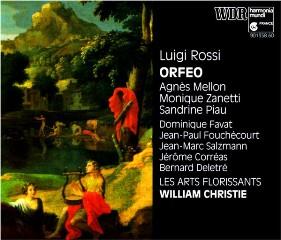Luigi Rossi - Orfeo (1991)
Luigi Rossi - Orfeo (1991)

1 - 1 Prologo 5:14 Atto I 1 - 2 Scena 1 12:07 1 - 3 Scena 2 6:03 1 - 4 Scena 3 7:42 1 - 5 Scena 4 13:59 1 - 6 Scena 5 11:36 Atto II 1 - 7 Scena 1 5:02 1 - 8 Scena 2 15:39 2 - 1 Scena 3 1:54 2 - 2 Scena 4 9:41 2 - 3 Scena 5 6:13 2 - 4 Scena 6 6:27 2 - 5 Scena 7 - Scena 8 5:09 2 - 6 Scena 9 8:11 2 - 7 "Non Hanno Alcun Remedio" 8:53 2 - 8 "Ah, Piangete" 9:32 Atto III 2 - 9 Scena 1 14:53 3 - 1 Scena 2 4:49 3 - 2 Scena 3 7:04 3 - 3 Scena 4 9:24 3 - 4 Scena 5 2:09 3 - 5 Scena 6 4:19 3 - 6 Scena 7 5:18 3 - 7 Scena 8 5:50 3 - 8 Scena 9 14:08 3 - 9 "Le Leggi" 6:36 3 - 10 Scena 10 6:42 3 - 11 "Amor Vero E Salda Fè" 4:26 Cast: Bernard DELETRÉ, bass, Augure Benoît THIVEL, alto, Apollo Jean-Marc SALZMANN, bass, Momo Jérome CORRÉAS, baritone, Endimione Marie BOYER, mezzo-soprano, Giunone Noémi RIME, soprano, Venere Jean-Paul FOUCHÉCOURT, tenor, Vecchia Nicholas ISHERWOOD, bass, Satiro Caroline PELON, soprano, Amore Dominique FAVAT, mezzo-soprano, Nutrice Sandrine PIAU, soprano, Aristeo Agnès MELLON, soprano, Orfeo Monique ZANETTI, soprano, Euridice Choir and Orchestra of Les Arts Florissants William Christie - conductor
The Roman composer Luigi Rossi was better known in his own time than he is today, and from the 1640s onwards many of his compositions, and particularly the chamber cantatas, were widely circulated in manuscript copies both inside and outside Italy. They are still occasionally heard in recitals and on record (a handful are currently available), but it should not be forgotten that Rossi's contemporary fame also rested on his operas: II palazzo incantato written for performance during the Roman carnival of 1642, and Orfeo composed in Paris to a commission from Cardinal Mazarin. At the back of the libretto for the Paris opera is the familiar story of the love of Orpheus and Euridice and the triumph of the god over the Underworld, but in accordance with both baroque convention and the political purpose of the work extra characters and situations have been added. Thus the three acts of the action are preceded by a prologue in which Victory praises Louis XIV (then aged nine and a half), and the simple outlines of the original narrative are filled out with the addition of Momus, Aristeo and Euridice's nurse as well as by a host of mythological figures. In all, the score requires 26 soloists together with a choir and a standard four-part French court opera orchestra.
The single most difficult interpretational difficulty of many early seventeenth-century operas is their length and the comparative homogeneity of the recitative style, the principal textual medium. That this was realized by contemporaries is clear from the remarks of the composer Domenico Mazzocchi, who explains that he had introduced 'semi-arias' into the score of his La Catena d'Adone in order to avoid tedium. For his part, Monteverdi had, by the time of his late Venetian operas, evolved a kind of hybrid style in which a fluid musical language was able to move easily between recitative and arioso. Rossi's language is different again in that it aims for variety by interpolating as many opportunities as possible for the characters to sing together, and by responding to the dramatic invitations extended by the many additional characters, some of whom are present to provide comic relief, interpolated into the simple Ovidian story. The wide range of contemporary styles and forms delights and surprises, and the characteristic French requirement of dance music prompts Rossi to an engagingly fresh and uncomplicated melodic style, particularly in the First Act. At the other end of the emotional range there are some effective (and affective) moments of high drama, notably at the arrival of the news of Euridice's death.
These features of the score are eagerly and sensitively seized upon by William Christie in this ambitious, innovative and highly enjoyable recording. Not all the attempts here at breathing histrionic life into the score are equally successful however. The Old Woman who appears at the beginning of the second act for example (portrayed, in a piece of cross-dressing typical of the period, by the tenor Jean-Paul Fouchecourt), does not pass comfortably or convincingly from semi-speech to song. Against this should be placed the wonderfully resonant and finely controlled bass singing of Bernard Deletre and, above all, the star performances of Agnes Mellon and Monique Zanetti. The latter's Euridice is light and sweet in tone, without too much vibrato but still with plenty of dramatic power and emotional range when needed. This is well matched by Mellon's Orfeo, and indeed some of the most exquisite moments in the entire recording are in their duets, above all ''Che dolcezza e la certezza'' with its deliciously strange harmonies. The choral singing is clear, bright, crisp and driven, though at times (as with the final chorus of Act 1) the forces seem to be too large, as if Christie is striving for effects beyond seventeenth-century experience. Given the unfamiliarity of this music, it would have been useful to have more information in the accompanying booklet about how the sole manuscript score, which is often rather sketchy and ambiguous in its indications and is clearly not a performance score, had been 'realized' and 'orchestrated', the perennial problems for any conductor working in this repertory. Overall, however, this is a fine and revelatory achievement.' ---Iain Fenlon, gramophone.co.uk
download (mp3 @VBR kbs):








